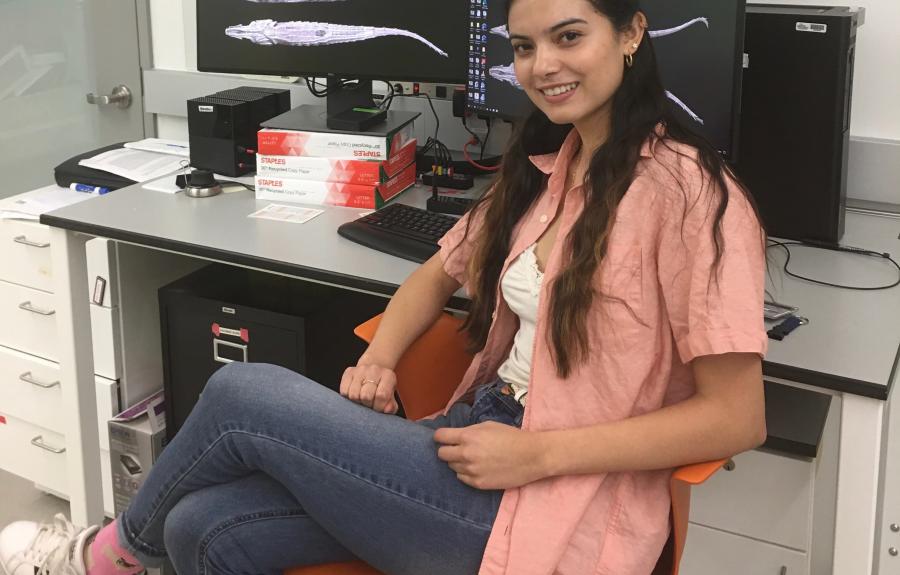Welcome to our Department
A concentration in Ecology and Evolutionary Biology within Cornell’s Biological Sciences major or a concentration within the Environment and Sustainability major provide undergraduates with an array of opportunities to become immersed in the study of biodiversity, evolutionary biology, community ecology, organismal biology and topics related to sustainability, conservation and global climate change.
Because of the breadth and importance of these issues in modern society, students from a broad range of study fields at Cornell, including Science of Earth Systems and Science & Technology Studies enjoy and value EEB courses.
Through coursework, field studies, and faculty-directed research projects, EEB students are exposed to a variety of disciplines and habitats ranging from local freshwaters to terrestrial ecosystems, including agricultural landscapes, to tropical oceans, alpine tundra, deserts and tropical rainforests. For a complete list of courses, follow this link to the Cornell Courses of Study.
Fostering diversity among students, researchers, and faculty is a priority for our department. We work to create an inclusive research, teaching, and learning environment and are committed to improving the representation of minority groups in our undergraduate programs. Embracing and valuing diversity and bringing together a wide range of experiences and worldviews enriches the overall college experience and is a major driver of scientific and societal progress. We encourage students from a diverse range of backgrounds to take E&EB courses or concentrate in Ecology and Evolutionary Biology. Below are resources to improve inclusion and representation of minority groups in our undergraduate programs. For more information, programs and resources please follow these links:
Courses, Field Studies and Undergraduate Research
The framework of EEB’s class roster for undergraduates is built around our two core courses, Ecology and the Environment (BioEE 1610) and Evolutionary Biology and Diversity (BioEE 1780). Students can then branch-out to discover …
- Conceptual principles in ecology and evolution;
- The taxonomy of worldwide flora and fauna, their ecology, evolution and organismal function;
- Biodiversity and organism interactions within particular environments and ecosystems (e.g., Marine Ecology, Field Ecology, Limnology).
Over 55% of EEB courses include outdoor or experiential components both off and on campus, enabling students and faculty to expand their horizons beyond the lecture hall. Field study opportunities include:
- Field Ecology (BioEE 3611)
- Stream Ecology (BioEE 4560)
- Special Topics in Ecology and Evolutionary Biology
(BioEE 4940) - Spring break in the Galapagos for Biology Scholars (special section of BioEE 1780)
- Organization for Tropical Studies (OTS): well-established and internationally recognized semester-long field courses for undergraduates in places like Costa Rica and South Africa.
- Shoals Marine Laboratory: offers field experiences through courses and research internships on an offshore island in Maine. Courses include introductory courses that satisfy basic requirements for the Cornell biology major as well as advanced courses.
- Winter Session, Tropical Field Ornithology
(BioEE 2640/2461/2642), in the Dominican Republic.
Research assistantships are also available for undergraduate students!
EEB faculty are active mentors who sponsor internships and independent research opportunities for undergraduates. Students can participate in lab or field-based research projects on the Cornell campus and in Ithaca NY, as well as study sites that range from Brazil to Alaska, and beyond. Interested? Contact our EEB professors directly to find out how to become a member of their research team.
EEB hosts a thriving group of undergraduates who undertake their own independent research, often culminating in a senior honors thesis. In a typical year, a dozen EEB concentrators graduate with honors recognition for their research accomplishments. Many of these undergraduate projects lead to peer-reviewed scientific publications authored by the undergraduate scholar. If you are intrigued by this opportunity, talk to your research advisor and contact Kristy Long (kll25@cornell.edu), the Curriculum Assistant in the Office of Undergraduate Biology (OUB) during your sophomore or junior year.
Career Paths and Alumni Spotlight!
Biology majors who have concentrated in Ecology and Evolutionary Biology have the skills needed to enter into a wide variety of career paths in education, research, law, environmental organizations, biology, medicine, and computer science. EEB graduates hold key positions at the New York Botanical Garden, the Environmental Protection Agency, the National Science Foundation, the National Academy of Sciences, the Nature Conservancy and various non-government organizations (NGOs) and industries focused on conservation, environmental issues, or educational outreach. Others have obtained teaching positions or work in research laboratories.
EEB undergraduates often continue their studies as graduate students in fields as diverse as environmental science, marine science, paleontology, and biogeochemistry to name just a few. Gap year options may include travel, and time spent working with The Peace Corps or Teach for America.
EEB alumnus, Allyson Evans (pictured) tells us about her experience as an undergrad at Cornell: "A lot of my time was spent at the Cornell University Museum of Vertebrates (CUMV) where I studied sexual dimorphism in the cranial skeletons of neotropical electric fish with my research advisor, Dr. Casey Dillman. I worked alongside an amazing suite of faculty members to curate and manage the teaching and research collections housed within the museum (some 1.5 million catalogued specimens!). I also served as a teaching assistant for BIOEE 2740 The Vertebrates: Comparative Anatomy, Function, Paleontology, and Evolution. CUMV and the department of Ecology and Evolutionary Biology will always be a second home for me!"
Allyson is currently a first-year PhD student and NSF Student Research Fellow at the Columbian College of Arts & Sciences. She is studying the kind of animals you don’t find in children’s fish tanks: hingemouths with giant snouts in their foreheads; elephantfish that generate electric shocks; and zebrafish with bizarre anatomical structures that connect their ears to their bladders! Working in Professor of Biology Patricia Hernandez’s Science and Engineering Hall lab, Allyson has access to anomalies like small-jawed butterflyfishes and wide-gilled paddlefishes. Using CT scanning technology, she will also study collections at the Smithsonian and the American Museum of Natural History. To learn more, follow this link to a recent article on the Columbian College website.

